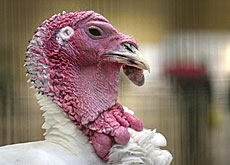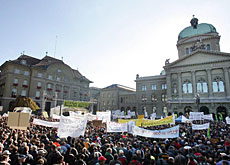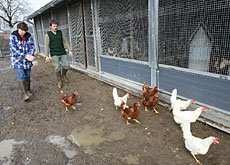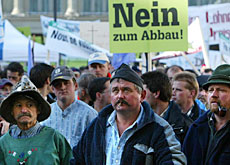Home-grown turkeys ruffle retailer’s feathers

Turkey farmers are up in arms at news that Migros, Switzerland's largest retailer, will import all its turkeys because home-grown ones are too expensive.
The decision highlights the difficulties facing Swiss farming, where production costs are anything but competitive.
At the beginning of the 1990s diversification and pressure from distributors drove some 50 breeders, mostly in the western cantons of Vaud and Fribourg, into the turkey business.
Migros itself sourced its turkeys from 52 Swiss farms, around 80 per cent of the total number of turkey farms in the country, according to the Swiss Farmers Association.
But Patrick Wilhem, head of marketing at Migros’ meat subsidiary Micarna, admits that Migros’ belief in turkeys hasn’t been echoed by that of customers.
“Critical mass was never reached,” he said. “Migros processes 60,000 chickens a day but only 350,000 turkeys a year.”
“As a business, we have to secure workplaces in a market undergoing a total change,” Wilhem added. “We can’t take the liberty of letting other sectors subsidise a production which does not meet the level of demand.”
As a result, Migros turned to cheaper producers in France, Germany and Hungary – something most distributors have been doing for a long time – thereby turning its back from June 2007 on a doubly handicapped Swiss market.
Not only do production costs (notably feeding the animals) mean Swiss turkey meat is two or three times as expensive as these other markets, but the system for importing will have completely changed by 2007.
Until now, only those people who slaughtered livestock in Switzerland could import it. A slice of their income enabled them to cover the price difference between expensive Swiss birds and their cheaper European cousins.
From now on, Swiss turkeys will lose this support. Import quotas will be granted according to a system of auctioning.
John Dupraz, vice-president of the Swiss Farmers Association, believes Migros’ decision is a result of the merger of its two meat subsidiaries.
Duprez, also a parliamentarian for the centre-right Radical Party, said they ignored all social considerations – “it was only about making cash. The result is that this sector has been liquidated.”
Ruffled feathers
Migros’ decision – somewhat at odds with its claims to focus on home-grown produce – has unsurprisingly caused quite a reaction.
According to the FRC, a consumer association from French-speaking Switzerland, many Swiss want to be able to choose between Swiss meat, which is produced to very strict guidelines, and meat from elsewhere.
Following a political agreement, Migros will hold discussions with producers. A label guaranteeing home-grown quality is one possibility.
But “ultimately the customer will decide”, said Wilhem, who believes Swiss turkeys are a special case as no other branch of the meat industry would in reality have to worry itself over such an issue.
Stuffed
However, Dupraz sees in this crisis a new development, namely that when it comes to production costs, Swiss farming can’t always keep up with the European Union (EU).
This is down to the generally higher prices in Switzerland and margins which hold back middlemen and salaries. Not to mention Swiss legal requirements and production standards.
“Despite all our efforts it’s still not enough and that hurts!” he said. “Take cereals which are used to make bread – we’ve lowered our costs there by 50 per cent over ten years yet we are still too expensive. And the pressure on prices will only increase with globalisation.”
Dupraz therefore believes it is vital to find ways of competing more with European prices. Does that mean an agricultural free-trade accord with the EU? That is the current route being considered.
“We will need a transitional period and supporting measures, but we must consider it an option, since apart from top-of-the-range products – such as wine, cheese and items marked with the AOC quality label – we might as well shut everything down in Switzerland and import it all.”
swissinfo, Pierre-François Besson
There are around 65,000 farms across Switzerland compared with 80,000 in 1990. The number of farms goes down by five every day. In 2001, only 4.1% of the population was working in agriculture.
Between 2003 and 2007, the government plans to spend SFr14.092 billion ($11.5 billion) on the agricultural sector.
Between 2008 and 2011, it intends to reduce this sum to SFr13.4 billion.
In 2003, agriculture represented 1.4% of Switzerland’s gross domestic product.
Around 65 Swiss farms breed turkeys.
In 2004 Swiss farmers produced 3,383 tonnes of turkey to be consumed, compared with 54,538 tonnes of chicken.
Turkey is rarely eaten as a whole roast bird in Switzerland as a traditional meal, unlike in Britain and the United States.

In compliance with the JTI standards
More: SWI swissinfo.ch certified by the Journalism Trust Initiative



You can find an overview of ongoing debates with our journalists here. Please join us!
If you want to start a conversation about a topic raised in this article or want to report factual errors, email us at english@swissinfo.ch.